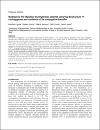Isolation of the Bacillus thuringiensis plasmid carrying Bacthuricin F4 coding genes and evidence of its conjugative transfer
التاريخ
2014-06-11البيانات الوصفية
عرض كامل للتسجيلةالملخص
INTRODUCTION:
Conjugation is an excellent natural mode of DNA transfer in vivo between bacteria, particularly when these conjugative elements carry technological traits such as bacteriocin encoding genes. In the present work, the bacteriocinogenic plasmid pIBF4 from Bacillus thuringiensis responsible of Bacthuricin F4 synthesis was isolated and characterized.
METHODOLOGY:
To isolate pIBF4, the total plasmid DNA from a non-bacteriocin transposant carrying the mini-Tn10 spectinomycin selective marker was extracted and used to transform Escherichia coli strain Top10. PIBF4 was extracted from the obtained transformant and then subjected to restriction enzyme analysis. Plasmid curing experiments were conducted to test the stability of pIBF4 at a stringent temperature of 42°C. Conjugative behavior of pIBF4 was assessed by mating experiments using the non-bacteriocin transposant mutant as a donor strain and several Bacillus thuringiensis strains as recipients.
RESULTS:
The pIBF4 plasmid was isolated and had a molecular weight of 19.1 kb. Ninety-five percent of cells retained the pIBF4 plasmid after 200 generations, demonstrating its high stability. PIBF4 was successfully transferred to Bacillus thuringiensis HD1CryB strain with a transfer frequency of 1x10(-8) transconjugants per donor cell. The study of the recipient host range revealed that pIBF4 is specifically transferable to Bacillus thuringiensis strains with variable transfer frequencies depending on the recipient host strain.
CONCLUSION:
Our results show that pIBF4 is a 19.1 kb highly stable plasmid transferable by conjugation to Bacillus thuringiensis strains with deferent transfer frequencies.
المجموعات
- العلوم البيولوجية والبيئية [920 items ]


